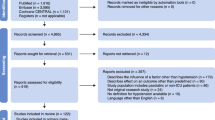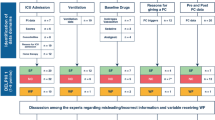Abstract
Robert Truog describes the controversial randomized controlled trials (RCTs) of extracorporeal membrane oxygenation (ECMO) therapy in newborns. Because early results with ECMO indicated that it might be a great advance, saving many lives, Truog argues that ECMO should not have been tested using RCTs, but that a long-term, large-scale observational study of actual clinical practice should have been conducted instead. Central to Truog’s argument, however, is the idea that ECMO is an unusual case. Thus, it is an open question whether Truog’s conclusions can be extended to other areas of medical research. In this paper, I look at epistemological and ethical issues arising in the care of patients with chronic diseases, using ECMO as a starting point. Both the similarities and the dissimilarities of these two cases highlight important issues in biomedical research and support a conclusion similar to Truog’s. Observational studies of clinical practice provide the best evidence to inform the treatment of patients with chronic disease.
Similar content being viewed by others
Notes
James Ware outlines the sample size calculations used in the design of this study [7]. He shows that using the expected survival rates (based on previous studies) for both ECMO and conventional therapy and continuing Phase I until four deaths had occurred in one group would have a power of .77, compared with .55 for three deaths and .84 for five deaths (all calculated for a Type I error rate of .05). The study designers chose to continue Phase I until the fourth death in one arm on the basis of these power calculations.
For further discussion of the relationship between ethical and epistemological issues in the ECMO trials, see [10].
In addition to Truog’s article, the ECMO studies were debated in two issues of the journal Statistical Science, which published two target articles drawing on the ECMO case [7, 11], together with a series of replies to each article. Ware, one of the researchers who conducted the second ECMO trial, defends the trial design as a compromise between ethical and methodological concerns [7]. Royall [11] and Berry [12] reach conclusions about the ECMO research that are similar to Truog’s. In all of these discussions, there is a general consensus that ECMO is a special case.
Part of the rationale for using a control group is to account for spontaneous recovery rates in each group. The fluctuations in symptom severity that occur in chronic diseases present a more complex version of this problem.
Note, too, that the common practice of prescribing doses of a drug that differ from the “standard” regimen tested in clinical trials further calls into question the generalizability of RCTs of any treatment.
Restricting trial entry to patients newly diagnosed and previously untreated for the disease in question would be one possible response; however, in addition to adding greatly to the time required to recruit sufficient patients for a trial, it is also ethically questionable (as argued, for example, by AIDS activists, see [18]) and raises the question of the generalizability of the results of the trial to patients with longer-standing diseases.
It should also be noted that, in general, EBM tends to recommend that subgroup analyses be viewed with skepticism; see, e.g., [27, pp. 160–161]. If this attitude is generally accepted, this would mean that subgroup analyses may not be done, even in large pragmatic trials.
References
Truog, Robert D. 1992. Randomized controlled trials: Lessons from ECMO. Clinical Research 40 (3): 519–527.
Sackett, David L., William M.C. Rosenberg, J.A. Muir Gray, R. Bryan Haynes, and William S. Richardson. 1996. Evidence-based medicine: What it is and what it isn’t. BMJ 312: 71–72.
Bartlett, Robert H. 1984. Extracorporeal oxygenation in neonates. Hospital Practice April: 139–151.
Wung, Jen-Tien, L. Stanley James, Eitan Kilchevsky, and Edward James. 1985. Management of infants with severe respiratory failure and persistence of the fetal circulation, without hyperventilation. Pediatrics 76 (4): 488–494.
Bartlett, Robert H., Dietrich W. Roloff, Richard G. Cornell, Alice French Andrews, Peter W. Dillon, and Joseph B. Zwischenberger. 1985. Extracorporeal circulation in neonatal respiratory failure: A prospective randomized study. Pediatrics 76: 479–487.
O’Rourke, P. Pearl, Robert K. Crone, Joseph P. Vacanti, James H. Ware, Craig W. Lillehei, Richard B. Parad, and Michael F. Epstein. 1989. Extracorporeal membrane oxygenation and conventional medical therapy in neonates with persistent pulmonary hypertension of the newborn: A prospective randomized study. Pediatrics 84: 957–963.
Ware, James H. 1989. Investigating therapies of potentially great benefit: ECMO. Statistical Science 4: 298–340.
Zelen, Marvin. 1979. A new design for randomized clinical trials. New England Journal of Medicine 300: 1242–1245.
Freedman, Benjamin. 1987. Equipoise and the ethics of clinical research. New England Journal of Medicine 317 (3): 141–145.
Worrall, John. 2008. Evidence and ethics in medicine. Perspectives in Biology and Medicine 51 (3): 418–431.
Royall, Richard M. 1991. Ethics and statistics in randomized clinical trials. Statistical Science 6: 52–88.
Berry, Donald A. 1989. Comment: Ethics and ECMO. Statistical Science 4 (4): 306–310.
Vliet Vlieland, Thea P. 2002. Managing chronic disease: Evidence-based medicine or patient centred medicine? Health Care Analysis 10 (3): 289–298.
Hoffman, Catherine, Dorothy Rice, and Hai-Yen Sung. 1996. Persons with chronic conditions: Their prevalence and costs. Journal of the American Medical Association 276 (18): 1473–1479.
Schellevis, François G., Jolanda van der Velden, Eloy van de Lisdonk, Jacques T. van Eijk, and Chris van Weel. 1993. Comorbidity of chronic diseases in general practice. Journal of Clinical Epidemiology 46 (5): 469–473.
Masoudi, Frederick A., Edward P. Havranek, Pam Wolfe, Cary P. Gross, Saif S. Rathore, John F. Steiner, Diana L. Ordin, and Harlan M. Krumholz. 2003. Most hospitalized older persons do not meet the enrollment criteria for clinical trials in heart failure. American Heart Journal 146 (2): 250–257.
Lloyd-Williams, Ffion, Frances Mair, Christopher Shiels, Barbara Hanratty, Pauline Goldstein, Susan Beaton, Simon Capewell, Michael Lye, Ruth McDonald, Christopher Roberts, and Derek Connelly. 2003. Why are patients in clinical trials of heart failure not like those we see in everyday practice? Journal of Clinical Epidemiology 56 (12): 1157–1162.
Epstein, Steven. 1996. Impure science: AIDS, activism and the politics of knowledge. Berkeley: University of California Press.
Sackett, David L., Sharon E. Straus, William S. Richardson, William Rosenberg, and R. Bryan Haynes. 2000. Evidence-based medicine: How to practice and teach EBM, 2nd ed. London: Churchill Livingston.
Hoppe, Daniel J., Emil H. Schemitsch, Saam Morshed, Paul Tornetta, and Mohit Bhandari. 2009. Hierarchy of evidence: Where observational studies fit in and why we need them. Journal of Bone and Joint Surgery 92 (S3): 2–9.
Urbach, Peter. 1985. Randomization and the design of experiments. Philosophy of Science 52 (2): 256–273.
Worrall, John. 2002. What evidence in evidence-based medicine? Philosophy of Science 69: S316–S330.
Grossman, Jason, and Fiona Mackenzie. 2005. The randomized controlled trial: Gold standard, or merely standard? Perspectives in Biology and Medicine 48 (4): 516–534.
Cartwright, Nancy. 2007. Are RCTs the gold standard? BioSocieties 2: 11–20.
Borgerson, Kirstin. 2009. Valuing evidence: Bias and the evidence hierarchy of evidence-based medicine. Perspectives in Biology and Medicine 52 (2): 218–233.
Bluhm, Robyn. 2009. Some observations on ‘observational’ research. Perspectives in Biology and Medicine 52 (2): 252–263.
Guyatt, Gordon, and Drummond Rennie, eds. 2002. Users’ guides to the medical literature: A manual for evidence-based practice. Chicago: American Medical Association Press.
Concato, John, Nirav Shah, and Ralph I. Horowitz. 2000. Randomized, controlled trials, observational studies, and the hierarchy of research designs. New England Journal of Medicine 342 (25): 1887–1892.
Benson, Kjell, and Arthur J. Hartz. 2000. A comparison of observational studies and randomized controlled trials. New England Journal of Medicine 342 (25): 1878–1886.
Jefford, Michael, Martin R. Stockler, and Martin H.N. Tattersall. 2003. Outcomes research: What is it and why does it matter? Internal Medicine Journal 33: 110–118.
Author information
Authors and Affiliations
Corresponding author
Rights and permissions
About this article
Cite this article
Bluhm, R. The epistemology and ethics of chronic disease research: Further lessons from ECMO. Theor Med Bioeth 31, 107–122 (2010). https://doi.org/10.1007/s11017-010-9139-8
Published:
Issue Date:
DOI: https://doi.org/10.1007/s11017-010-9139-8




